17 start with O start with O
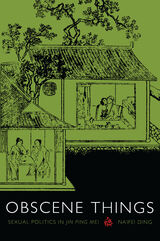
The story of a seductive bondmaid-concubine, sexual opportunism, domestic intrigue, adultery and death, Jin Ping Mei has often been critiqued based on the coherence of the text itself. Concentrating instead on the processes of reading and on the social meaning of this novel, Ding looks at the various ways the tale has been received since its first dissemination, particularly by critiquing the interpretations offered by seventeenth-century Ming literati and by twentieth-century scholars. Confronting the gender politics of this “pornographic” text, she troubles the boundaries between premodern and modern readings by engaging residual and emergent Chinese gender and hierarchic ideologies.
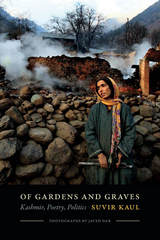

What is the connection between the United States' imbalance of trade with Japan and the imbalance of translation in the other direction? Between Western literary critics' estimates of Japanese fiction and Japanese politicians' "America-bashing"? Between the portrayal of East-West relations in the film Merry Christmas, Mr. Lawrence and the terms of the GATT trade agreements?
In this provocative study, Masao Miyoshi deliberately adopts an off-center perspective--one that restores the historical asymmetry of encounters between Japan and the United States, from Commodore Perry to Douglas MacArthur--to investigate the blindness that has characterized relations between the two cultures.
Both nations are blinkered by complementary forms of ethnocentricity. The United States--or, more broadly, the Eurocentric West--believes its culture to be universal, while Japan believes its culture to be essentially unique. Thus American critics read and judge Japanese literature by the standards of the Western novel; Japanese politicians pay lip service to "free trade" while supporting protectionist policies at home and abroad.
Miyoshi takes off from literature to range across culture, politics, and economics in his analysis of the Japanese and their reflections in the West; the fiction of Tanizaki, Mishima, Oe; trade negotiations; Japan bashing and America bashing; Emperor worship; Japanese feminist writing; the domination of transcribed conversation as a literary form in contemporary Japan. In his confrontation with cultural critics, Miyoshi does not spare "centrists" of either persuasion, nor those who refuse to recognize that "the literary and the economical, the cultural and the industrial, are inseparable."
Yet contentious as this book can be, it ultimately holds out, by its example, hope for a criticism that can see beyond the boundaries of national cultures--without substituting a historically false "universal" culture--and that examines cultural convergences from a viewpoint that remains provocatively and fruitfully off center.

Based on detailed studies of specific communities and plantations and an analysis of the regional political economy of oil palm, this book unpicks the dominant policy narratives, business strategies, models of land acquisition, and labour-processes. It presents the oil palm industry in Malaysia and Indonesia as a complex system in which land, labour and capital are closely interconnected. Understanding this complex is a prerequisite to developing better strategies to harness the oil palm boom for a more equitable and sustainable pattern of rural development.
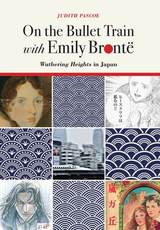
In this and in her previous book, The Sarah Siddons Audio Files, Pascoe’s engaging narrative innovates a new scholarly form involving immersive research practice to attempt a cross-cultural version of reader-response criticism. On the Bullet Train with Emily Brontë will appeal to scholars in the fields of 19th-century British literature, adaptation studies, and Japanese literary history.

In 2013, Chinese leader Xi Jinping announced a campaign for national rejuvenation. The One Belt One Road initiative, or OBOR, has become the largest infrastructure program in history. Nearly every Chinese province, city, major business, bank, and university have been mobilized to serve it, spending hundreds of billions of dollars overseas building ports and railroads, laying fiber cables, and launching satellites. Using a trove of Chinese sources, author Eyck Freymann argues these infrastructure projects are a sideshow. OBOR is primarily a campaign to restore an ancient model in which foreign emissaries paid tribute to the Chinese emperor, offering gifts in exchange for political patronage. Xi sees himself as a sort of modern-day emperor, determined to restore China’s past greatness.
Many experts assume that Xi’s nakedly neo-imperial scheme couldn’t possibly work. Freymann shows how wrong they are. China isn’t preying on victims, Freymann argues. It’s attracting willing partners—including Western allies—from Latin America to Southeast Asia to the Persian Gulf. Even in countries where OBOR megaprojects fail, Freymann finds that political leaders still want closer ties with China.
Freymann tells the monumental story of Xi’s project on the global stage. Drawing on primary documents in five languages, interviews with senior officials, and on-the-ground case studies from Malaysia to Greece, Russia to Iran, Freymann pulls back the veil of propaganda about OBOR, giving readers a page-turning world tour of the burgeoning Chinese empire, a guide for understanding China’s motives and tactics, and clear recommendations for how the West can compete.

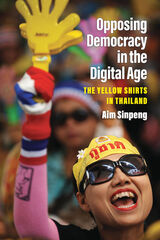
Opposing Democracy in the Digital Age is about why ordinary people in a democratizing state oppose democracy and how they leverage both traditional and social media to do so. Aim Sinpeng focuses on the people behind popular, large-scale antidemocratic movements that helped bring down democracy in 2006 and 2014 in Thailand. The yellow shirts (PAD—People’s Alliance for Democracy) that are the focus of the book are antidemocratic movements grown out of democratic periods in Thailand, but became the catalyst for the country’s democratic breakdown. Why, when, and how supporters of these movements mobilize offline and online to bring down democracy are some of the key questions that Sinpeng answers. While the book primarily uses a qualitative methodological approach, it also uses several quantitative tools to analyze social media data in the later chapters. This is one of few studies in the field of regime transition that focuses on antidemocratic mobilization and takes the role of social media seriously.
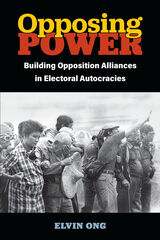
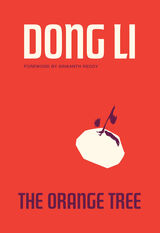
Dong Li’s The Orange Tree is a collection of narrative poems that braids forgotten legends, personal sorrows, and political upheavals into a cinematic account of Chinese history as experienced by one family. Amid chaos and catastrophe, the child narrator examines a yellowed family photo to find resemblances and learns a new language, inventing compound words to conjure and connect family stories. These invented words and the calligraphy of untranslated Chinese characters appear in lists separating the book’s narrative sections.
Li’s lyrical and experimental collection transcends the individual, placing generations of family members and anonymous others together in a single moment that surpasses chronological time. Weaving through stories of people with little means, between wars and celebrations, over bridges and walls, and between trees and gardens, Li’s poems offer intimate perspectives on times that resonate with our own. The result is an unflinching meditation on family history, collective trauma, and imaginative recovery.
The Orange Tree is the recipient of the inaugural Phoenix Emerging Poet Book Prize for 2023.
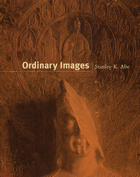
Situating his study in the gaps between conventional categories such as Buddhism, Daoism, and Chinese popular art, Abe examines works—including some of the earliest known examples of Buddha-like images in China—that were commissioned by patrons of modest standing and produced by nameless artists and artisans. Sophisticated and lucidly written, Ordinary Images offers an unprecedented exploration of the lively and diverse nature of image making and popular practices.
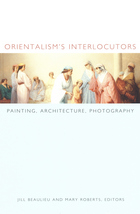
Looking at the political significance of cross-cultural encounters refracted through the visual languages of Orientalism, the contributors engage with pressing recent debates about indigenous agency, postcolonial identity, and gendered subjectivities. The very range of artists, styles, and forms discussed in this collection broadens contemporary understandings of Orientalist art. Among the artists considered are the Algerian painters Azouaou Mammeri and Mohammed Racim; Turkish painter Osman Hamdi; British landscape painter Barbara Bodichon; and the French painter Henri Regnault. From the liminal "Third Space" created by mosques in postcolonial Britain to the ways nineteenth-century harem women negotiated their portraits by British artists, the essays in this collection force a rethinking of the Orientalist canon.
This innovative volume will appeal to those interested in art history, theories of gender, and postcolonial studies.
Contributors. Jill Beaulieu, Roger Benjamin, Zeynep Çelik, Deborah Cherry, Hollis Clayson, Mark Crinson, Mary Roberts
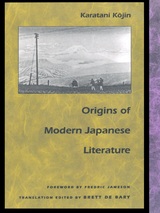
In a sweeping reinterpretation of nineteenth-and twentieth-century Japanese literature, Karatani Kojin forces a reconsideration of the very assumptions underlying our concepts of modernity. In his analysis, such familiar terms as origin, modern, literature, and the state reveal themselves to be ideological constructs. Karatani weaves many separate strands into an argument that exposes what has been hidden in both Japanese and Western accounts of the development of modern culture. Among these strands are: the "discovery" of landscape in painting and literature and its relation to the inwardness of individual consciousness; the similar "discovery" in Japanese drama of the naked face as another kind of landscape produced by interiority; the challenge to the dominance of Chinese characters in writing; the emergence of confessional literature as an outgrowth of the repression of sexuality and the body; the conversion of the samurai class to Christianity; the mythologizing of tuberculosis, cancer, and illness in general as a producer of meaning; and the "discovery" of "the child" as an independent category of human being.
A work that will be important beyond the confines of literary studies, Karatani's analysis challenges basic Western presumptions of theoretical centrality and originality and disturbs the binary opposition of the "West" to its so-called "other." Origins of Modern Japanese Literature should be read by all those with an interest in the development of cultural concepts and in the interrelating factors that have determined modernity.

Images of the city in literature and film help constitute the experience of modern life. Studies of the Japanese city have focused on Tokyo, but a fuller understanding of urban space and life requires analysis of other cities, beginning with Osaka. Japan’s “merchant capital” in the late sixteenth century, Osaka remained an industrial center—the “Manchester of the East”—into the 1930s, developing a distinct urban culture to rival Tokyo’s. It therefore represents a critical site of East Asian modernity. Osaka Modern maps the city as imagined in Japanese popular culture from the 1920s to the 1950s, a city that betrayed the workings of imperialism and asserted an urban identity alternative to—even subversive of—national identity.
Osaka Modern brings an appreciation of this imagined city’s emphatic locality to: popular novels by Tanizaki Jun’ichirō, favorite son Oda Sakunosuke, and best-seller Yamasaki Toyoko; films by Toyoda Shirō and Kawashima Yūzō; and contemporary radio, television, music, and comedy. Its interdisciplinary approach creates intersections between Osaka and various theoretical concerns—everyday life, coloniality, masculinity, translation—to produce not only a fresh appreciation of key works of literature and cinema, but also a new focus for these widely-used critical approaches.

In late 2019, as a deadly pandemic began to take hold, China’s Wuhan province was the first to feel the effects. As the virus spread, the streets and squares of the world emptied, and the structures of our social world were redefined.
In response to the pandemic, Jiang Jiehong convened in-conversation talks with twelve figures—such as Chen Danqing, Pi Li, Xiang Biao, and Zhang Peili, among others—from different disciplines in the Chinese-speaking world, including anthropology, architecture, art, curation, fashion, film, literature, media, museum, music, and photography. Presented here, the conversations foster new understandings of the ongoing crisis. The discussions explore the threat of the invisible; notions of distance and spatialization, separation and isolation, communication and mobility, discipline and surveillance, and community and collectiveness; and China’s changing relationship with the rest of the world. These illuminating reflections on the global crisis allow us to re-examine past norms and begin to form visions of a post-Covid world.
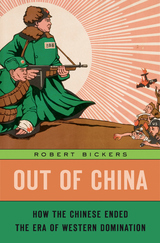
Nationalism matters in China, and what matters in China matters to everyone. China’s new nationalism, Robert Bickers shows, is rooted not in its present power but in shameful memories of its former weaknesses. Invaded, humiliated, and looted in the nineteenth and twentieth centuries by foreign powers, China looks out at the twenty-first century through the lens of the past. History matters deeply to Beijing’s current rulers, and Out of China explains why.
Bickers tracks the long, often agonizing process by which the Chinese regained control of their own country. He describes the corrupt, lurid modernity of prewar Shanghai, the often tiny patches of extraterritorial land controlled by foreign powers, the entrepôts of Hong Kong and Macao, and the myriad means—through armed threats, technology, and legal chicanery—by which China was kept subservient until, gradually, it emerged from Western control. This plural and partial subjugation of China is a story that involves not only European powers and Japan but also the United States.
This complex history must be grasped not to atone for the sins of the past but to recognize China’s internationalized landscapes with all their contradictions, violence, cosmopolitanism, and ambitions. The story of the foreign presence in China in the nineteenth and twentieth centuries is too important to be left in the hands of the Chinese party-state and its approved script. Out of China is essential reading for anyone wishing to understand what shapes China’s view of the world in the twenty-first century.

The writer Nakagami Kenji (1946-1992) rose to fame in the mid-1970s for his vivid stories about a clan scarred by violence and poverty on the underside of the Japanese economic miracle. Drawing upon the lives, experiences, and languages of the burakumin, the outcaste communities long discriminated against in Japanese society as a defiled underclass, Nakagami's works of fiction and nonfiction record with vitality and violence the realities—actual and imagined—of buraku culture.
In this critical study of Nakagami's life and oeuvre, Eve Zimmerman delves into the writer's literary world, exploring the genres, forms, and themes with which Nakagami worked and experimented. These chapters trace the biographical thread running through his works while foregrounding such diverse facets of his writing as his interest in the modern possibilities of traditional myths and forms of storytelling, his deployment of shocking tropes and images, and his crafting of a unique poetic language.
By bringing to the fore the literary urgency and social engagement that informed all aspects of Nakagami's creative and intellectual production, from his works of prose and poetry to his criticism, this book argues eloquently and effectively for us to appreciate Nakagami as a distinctive and relevant voice in modern Japanese literature.
READERS
Browse our collection.
PUBLISHERS
See BiblioVault's publisher services.
STUDENT SERVICES
Files for college accessibility offices.
UChicago Accessibility Resources
home | accessibility | search | about | contact us
BiblioVault ® 2001 - 2024
The University of Chicago Press









